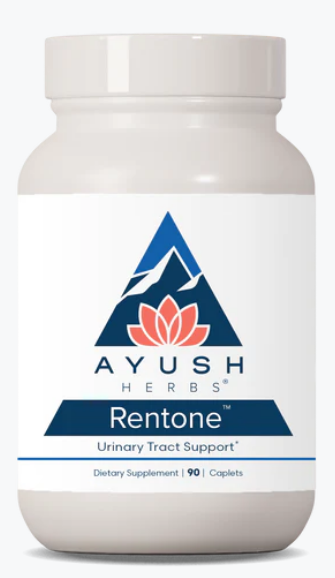Rentone™ is a formula for kidney and urinary support with a unique combination of Eastern and Western herbs in addition to other nutrients that increase its optimal effect on the eliminative system. Didymocarpus pedicellata is an Ayurvedic herb also known as pathar phori. In Sanskrit, the name means 'that which breaks stones.' Saxifraga ligulata has a similar meaning, 'the plant which breaks rocks in order to grow' and also has astringent, laxative, diuretic, and lithotrophic properties, as does Tribulus terrestris. Rubia cordifolia has antiseptic and deobstruent properties. Ocimum sanctum (holy basil) is used here for its immune-supporting and diuretic actions. Shilajit is an asphaltum (mineral pitch) obtained in the Himalayan region of India and is considered a rasayana (adaptogen). Shilajit contains at least 85 minerals in ionic form and has been used traditionally for centuries for genitourinary and immune support, as well as for its aphrodisiac and purifying properties. Arctostaphylos uva-ursi is a European herb, the leaves of which contain 10% of the most active principles of arbutin, which splits into glucose and hydroquinone in the kidneys. Cranberry has traditionally been used to support the reduction in the ability of bacteria to adhere to the lining of the bladder and urethra. Mimosa pudica (lajja, or lajwanti) is traditionally used for urinary conditions. Dolichos biflorus is also known as Kulatha beans, the seeds of which are astringent, diuretic, and tonifying, and have been used traditionally in support of renal and urinary bladder conditions. Cyperus rotundus is a dried tuberous root known as soucher, which is known to have diuretic, diaphoretic, and astringent properties. It is traditionally used for stomach and bowel complaints. Crataeva religiosa, also known as varuna (three-leaved caper), contains saponins and tannins in its bark. In Ayurvedic medicine, varuna is used to tonify the muscles of the bladder. It also helps support a healthy inflammatory response of the genitourinary system and has a diuretic effect. Achyranthus aspera (apamarg) is traditionally used as a diuretic and to normalize pH.



